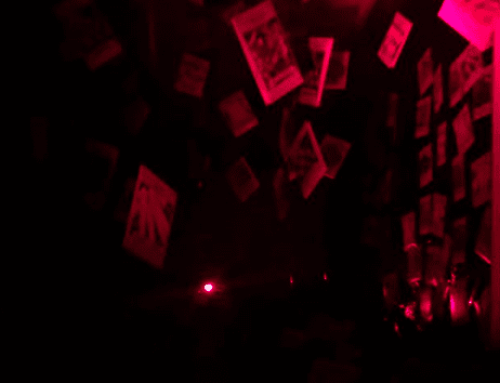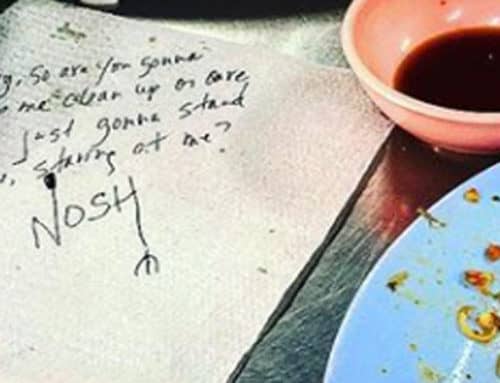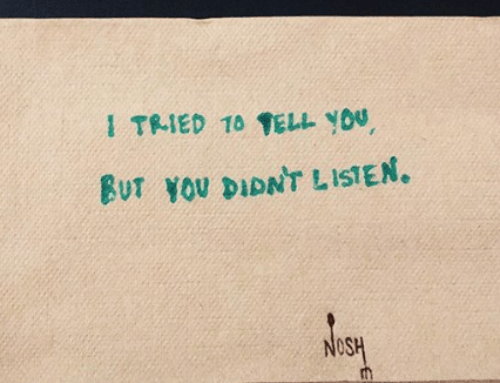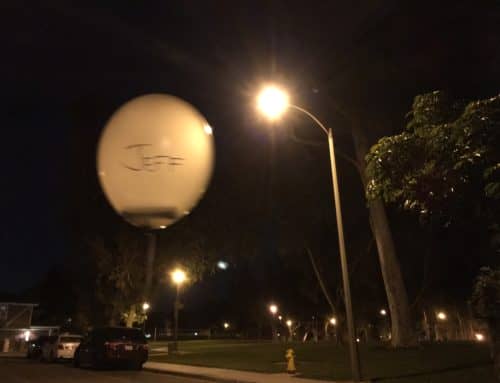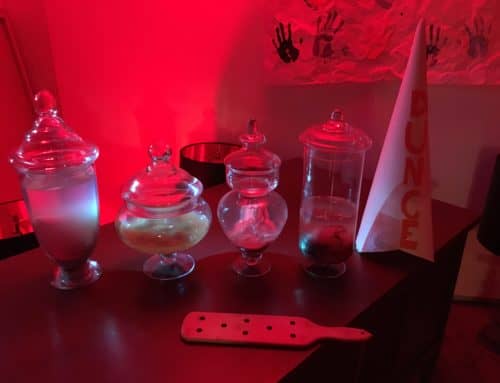EDITOR’S NOTE: Since publication of this article, several allegations of sexual assault and abuse have come to light against one of the creators of Nocturnal Fandango. We at HorrorBuzz believe that horror and immersive experiences should be a safe space for everyone, and can longer recommend their shows in good faith. We will leave the article as originally published below, but urge you to think twice before attending any of their shows.
I’ll be honest; I had a rough time writing the introduction to this piece. Not because I wasn’t interested or because nothing came to mind; it was quite the opposite of that. The biggest issue for me was being able to put into words just exactly how I feel about this group of storytellers in a way that would make sense to other people. Well, make sense and not come off as the nonsensical ramblings of a man who has done his fair share of raving about them. But those ravings are a good thing, because being able to sing their praises is something I’ve grown quite comfortable with.
Immersive theater is a delicate art to do, and do right. There are many companies in the Southern California area that do experiences and shows quite well. As readers to this site know by now, I’ve been to more than I can count. But while they are all great in their own ways, there are only a handful that really get to me; shows that make me continue thinking about them for days afterward. However, there is only one company that truly and profoundly touched me in such a way that really changed the way I viewed myself, my life, and quite honestly, how I view not just immersive theater, but theater in general. That company is none other than Nocturnal Fandango.
Yes, I have written extensively about them during the latter half of 2017, and with good reason; their shows are that damn good. While I did not attend any of their inaugural effort, HAVE YOU SEEN JAKE, I heard nothing but great things about it. In fact, it was the ravings of many friends who did attend that led me to get involved in THE SUDDEN LONELINESS GIFT. And as some of you may remember from my reviews last year, it was an intensely personal journey that I will remember for the rest of my life.
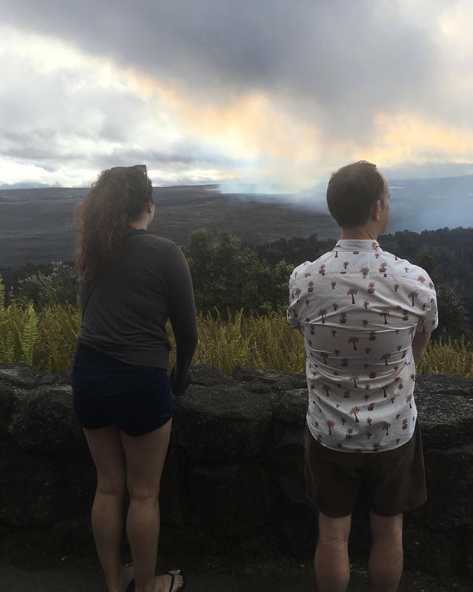
Chelsea, Kevin, and a volcano (Photo: Nocturnal Fandango)
The credit for that goes to the three individuals behind Nocturnal Fandango’s success: Chelsea Morgan, Kevin Davidson, and Jason Davidson (better known to us simply as The Organizers). Over the course of seven months or so, these masterful storytellers crafted an experience so intensely personal to everyone participating that it touched us in ways we never could have imagined.
Even now, months later, the things I learned are still buzzing in my head. I sat down with The Organizers recently (at the very same coffee shop where I once met a horse-headed man as part of the experience) to chat with them about their work, and peek behind the curtain a bit into their creative process.
Of course, the first thing I had to inquire about was how they decided to get into immersive theater to begin with. I was not surprised to find out that the Davidsons, Kevin and Jason, attended a lot of extreme shows a few years back. Visiting such experiences as ALONE’s Halloween 2014 offering, BLACKOUT’s House, and different Heretic shows gave them a taste of the ‘extreme’ side of Los Angeles’ immersive offerings. However, while they enjoyed them, they wanted something more.
“With my background in teaching performance, I felt that setting these strange scenes was the drive, not the narrative, and that’s a completely valid form of storytelling. But I was interested in combining this idea of absurdity and intensity with resonant characters” said Jason. “I turned to Kevin and said ‘We can do this.’” The two sat down shortly after, and decided that if they were going do venture out on their own, they wanted to tell stories that were important to them, and to also try to raise the bar in regards to the acting.
“We wanted to do something that was more dialogue driven between the actors and the audience,” said Kevin. “To give them a voice as part of the story, and not just have the scene happen to them.”

Jason and Kevin (Photo: Nocturnal Fandango)
Both of them agreed that they wanted to draw from the full spectrum of human emotions, and that fear-based, intense sense was one element of that palette.
“We wanted to shy away from the ‘haunt’ title, because of the connotation that is brought along with it,” said Jason. “But there is a lot to learn from fear. We set out to do immersive theater, not necessarily horror, but with darker, emotional elements.”
Jason spoke about how he was out walking the dogs one night, and it suddenly came to him what they should do. He came home, spewed out a break-down to Kevin, and together they created characters from ideas like Grief and Hope, and HAVE YOU SEEN JAKE was born.
“How do you bring a group of people together, and give them a common goal to work toward?” said Jason. “Losing a loved one was the way to do that, which is how JAKE came about.” Kevin was excited for the idea, and had grand plans to set out an entire business idea, and figured they would be able to start in about a year. However, nine days later, Jason sent out an email on a whim, something he called a ‘trial balloon.’
“As soon as he told me he did that, my response was like ‘A trial balloon? What does that even mean?!’” Kevin laughed. While Jason simply wanted to test the waters, to see if people would be interested, it quickly became its own animal.
“We breathed this tiny bit of life into the balloon…but now we had to keep it afloat. We had to keep creating,” said Jason. And create they did, because they quickly had experiences and shows soon after. However, though there was a team of people that led HAVE YOU SEEN JAKE, much of the enormous work-load was divided between Kevin and Jason.
“It was a great experience, but we soon realized that we were only two legs to our stool,” Kevin said. “We needed a third leg, someone with a similar passion for immersive work, really diverse talents and a desire to take risks.” And that was where Chelsea Morgan comes into the picture.
Chelsea was an audience member during JAKE. Someone had mentioned it to her off-hand at another immersive show, and her as soon as she heard about it, she was in.
“I emailed them that night, and for six months, I went through this personal story about JAKE,” she said. The finale of the show was an overnight experience in Idyllwild, CA. It was during this show that Chelsea had an awakening of sorts.
“JAKE was the first show that stopped being a show for me,” she said. “We attended the wake of this ‘friend,’ and everyone there was genuinely grieving. Even to this day, those feelings sit with me because of how real it became.” JAKE taught her that life only lasts so long, and sometimes you just have to take the jump to do things. Part of that jump for her was emailing the Davidsons to let them know how much the show affected her…and that, if they ever did something again, she wanted to be a part of it.
“I sat with Chelsea for about three hours at this very Starbucks,” Jason told me. “We talked about JAKE, about what we wanted to do next, and what she could do to help. I didn’t have to take her through what we do, because she got it, she lived it. She was very much a personality and a work style fit. I also explained how much work it was and she wasn’t dissuaded. Her dedication and talent became at heart at the core of SUDDEN LONELINESS.”
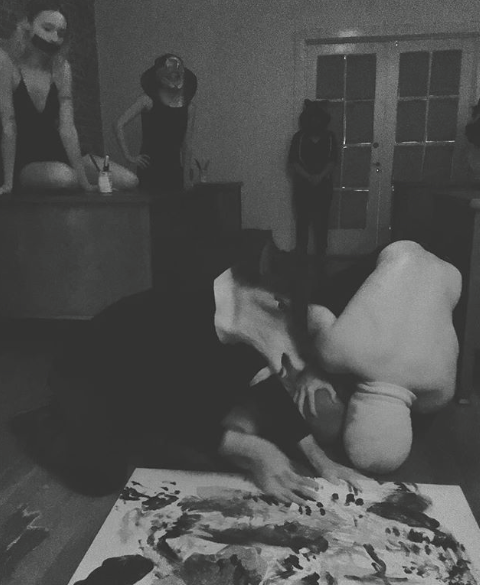
A scene from SLG’s Water And Fire (Photo: Nocturnal Fandango)
It’s interesting to note that this ‘interview’ of sorts that Jason had with Chelsea is very similar to the Nocturnal Fandango audition process.
“What we do is very different from handing someone a script or a new scene,” Jason explained. He went on to say how they are entrusting new cast members to go down these various rabbit holes with participants. Finding folks with that philosophy match can be challenging, but it’s worthwhile, considering the caliber of actors they do employ.
“We learned a lot by making mistakes early on,” Kevin said in regards to how they cast shows. “We shifted that approach for SUDDEN LONELINESS, and it helped the quality of the show. It’s time consuming to find the right people.” Jason usually does a screening phone call at first, and can tell within the first ten minutes if someone ‘gets’ it. After that, he and Chelsea met them in person to talk about what working with the company looks like before ever diving into upcoming specific roles.
“Trying to explain immersive theater to someone who hasn’t done it before is hard,” Chelsea explained. “I can talk your ear off, but until you’ve been through it, it doesn’t really click.”
“Our actors have to be okay with the fact that they are in service to their audience,” Jason said. “They have to be okay with the fact that they may give the best performance of their life, but they might only be doing it for a single audience member. They have to be able to move on from that, and let go.” This, of course, is very different from performers who wanted to be lauded as actors, who want their praises sung from the mountain tops. “There is nothing wrong with that, but it’s a mental shift for a lot of working actors.” That shift works, though, because as I’ve said before, the actors that Nocturnal Fandango work with are the best in the business.
When it came to asking specific questions about SUDDEN LONELINESS, the group was very candid about the origins of the story.
“We knew what Season 3 was going to look like after JAKE, but we also wanted to tell the SUDDEN LONELINESS story, and the only time that made sense to do that was right after JAKE,” said Jason. It was a way for them to solve the conundrum of who the ‘Organizers’ of JAKE were, which was central to the mystery. The reveals of the people behind the scenes were incredibly dramatic in that story, so they wanted to make sure they rode that wave correctly for their next story.
“Immersive as a genre is so suited to the meta nature,” said Jason. “For SUDDEN LONELINESS, it was necessary for us to be the most authentic versions of ourselves for these characters to work.”
It was interesting for them to reveal one of the potential, early plot points for SUDDEN LONELINESS that they didn’t wind up using. For those who don’t know the story, in its simplest terms, SUDDEN LONELINESS revolved around Kevin’s sudden death, and how the characters dealt with it by depositing memories to a fantastic bank of sorts in order to forget the pain. This may be ‘inside baseball’ for folks unless they participated, but there were early discussion of Kevin appearing in everyday scenes as an apparition of sorts, dialoguing only with Jason.
“I wanted a more dramatic button on that reveal,” Jason explained. “The suspension of disbelief was too much, so we decided to keep Kevin’s interactions to letters and dreamscapes to make the meta narrative work.”
Playing versions of themselves came with its own challenges, of course. Kevin embraced that he was “Dead Kevin”, and used his letter writing (which many participants received during the course of the show), as a way to process things in his own life that he had never shared before.
“It wasn’t as hard as I thought, I found ways to engage and bring myself out that way,” said Kevin.
For Chelsea, though, it was more complication. For her, she had close, personal ties to many of the participants in SUDDEN LONELINESS, and being able to draw that line between Chelsea: The Person and Chelsea: The Character was an interesting challenge.
“There were times where, in subtle ways, I would have to say to someone ‘I can’t talk about this right now, maybe there is a better time for it later,’” she explained. She spoke about how one friend would text her as a friend, and also interact with the ‘character’ version of her on the Nocturnal Fandango Slack channel. “It was a balance.” However, she was quick to note that her friends were respectful of waiting to let the story play out, instead of trying to get the inside scoop from her.
For Jason, there were elements he considered incorporating into his character, but ultimately dropped.
“While we know where we are going in the end, there are always so many threads and roads that we are paving in different directions in order to get there,” he said. “I wanted to focus a bit on Jason have substance abuse issues, amongst other things, but sometimes knowing what to let go of is critical in this sort of long-form narrative.”
Aside from the stories being personal to them, Nocturnal Fandango also prides themselves on making the narrative threads personal to their participants as well. Speaking from experience, I am constantly amazed at how The Organizers are able to tailor their story to each individual audience member, and work towards unique personal narratives, even within their own overarching story. But that amount of planning takes a lot of work and a lot of time to get right.
“When you go to the theater, everyone gets the same show, for the most part, just different seats,” said Jason. “But with us, we try to tailor it as best we can to our audience. Sometimes it works, sometimes it doesn’t, but it’s a risk we are willing to take.” Again, from personal experience, more often than not, it works, and works well.
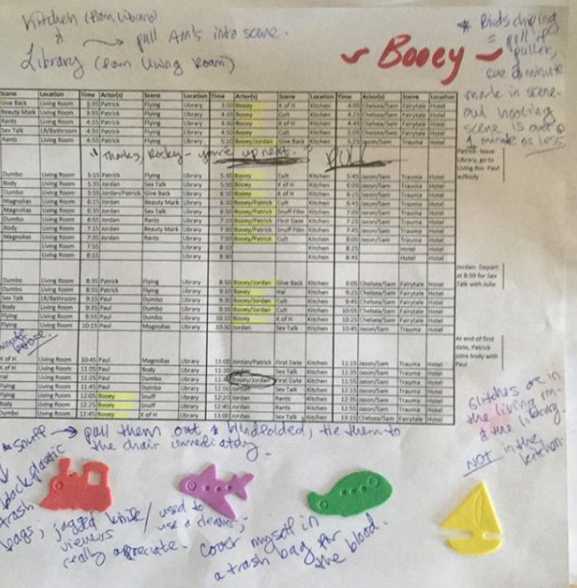
A glimpse into how they organize different scenes for different audience members. (Photo: Nocturnal Fandango)
“It’s a shared responsibility between the scene partner and the audience member,” said Kevin on this topic. “Not every scene is going to be the most monumental thing ever, because we take a lot of risks. Sometimes the choices land, and sometimes they fall flat, but we’re okay with that, because we’re taking that risk to tell the story will resonate deepest for you.”
They do love how people respond passionately to the different storylines they tell, and love that participants spend hours speculating why they received certain scenes.
“Sometimes, though, there is no deeper meaning. They just get a scene because we think they would enjoy it,” Kevin said.
What it comes down to is that Nocturnal Fandango truly does care about their audience. They not only care about them having a good experience, but also about them as people as well. For example, during SUDDEN LONELINESS’s ‘Therapy & Dreams’ show, they had about 80 people participate over the course of the weekend. While the basic gist of the show was the same for everyone, they had a lot of variation as to how scenes played out, allowing for hundreds of combinations.
That’s the beauty, and the downfall, of having so many variances, though. Sometimes people want everything, and it’s just not possible. Even in the same structured scene, how an actor’s tone is interpreted and how an audience member reacts to it can vastly change the entire feeling of the scene.
“We get to know these people,” Kevin said. “We are invested in every audience member. We’re attached to them. And we care that that they exit our world with a little something different than what they came in with.” They care so much that, for every show, they spend hours before hand with the cast discussing each and every audience member.
“The talks go like ‘Jeff is coming at 8PM, and here is where he is in the narrative, here is what intensity he has, and don’t forget to make this a point with him,’” Jason said, using me as an example. They make sure everyone is on the same page, to make sure the narrative points hit home for each audience member. That’s a mind-boggling amount of work, but one that obviously pays off with how deeply people connect with their shows.
“We have to make sure we shut up long enough to hear what a person is saying, and see where they fit into the story,” Jason explained. “We tell our actors to be quiet, to listen, and wait for the audience to give them something. We make sure they don’t feel like they need to fill in that gap…if we wait, then the audience member will give us something to work with, and sometimes the most beautiful moments come from that.”
“At the end of every show, the cast get together to talk about the individual moments and our favorite experiences,” Chelsea said. “We share what audience members said, how they reacted, and that often informs what their next interaction will be. If the cast didn’t listen in that moment, they would have missed it. But when they are listening, it becomes obvious where the path leads.”
“That comes back to risk,” Jason chimed in. “We had to learn to be unafraid of being imperfect. Taking those big risks bring the biggest rewards.”
Part of that listening to the audience is in how ‘intense’ they want their interactions to be. Before each show, Nocturnal Fandango sends a questionnaire to their audience to gauge any health problems, issues, and how intense they want it to be.
They all agreed that it wasn’t in their DNA to rough people up, and that intensity doesn’t just mean physically; it includes emotionally as well.
“A lot of our mild and moderate intensity folks still have very intense scenes,” Jason said. “But that comes from how the dialogue is presented, and it’s often not about the physical aspect.”
That’s not to say that physicality doesn’t come into play at all, because it absolutely does. However, they get smart about using it to their advantage.
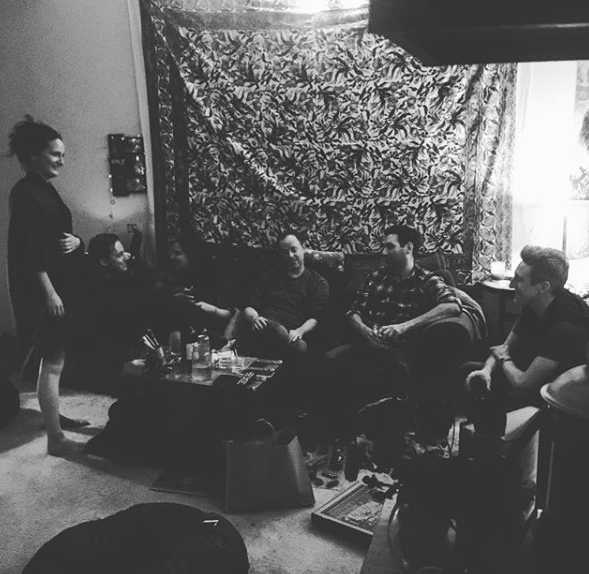
How Nocturnal Fandango creates theater (Photo: Nocturnal Fandango)
“It needs to be in service to the narrative,” Kevin said. “There is only so much we can do, and people respond in different ways.” However, their constant monitoring of situations and how audience members react led to many people increasing their intensity level over the course of SUDDEN LONELINESS because they trusted how Nocturnal Fandango would handle the situation. On top of that, they knew they had the support of the community to fall back on if need be.
The community aspect was something that was a bit of a surprise for Nocturnal Fandango; not in the fact that one formed, but in how it started to divide itself.
“With such strong ARG ties, everyone wanted to pick sides in JAKE, possibly because they were so used to doing so in other ARGS,” said Jason. “But that wasn’t the point here, there was no us versus them, it was everyone working together toward a shared goal.”
“Ultimately, people were there to work with each other, to learn from each other,” said Chelsea.
“The risk that is being taken is that sometimes the interpersonal factioning happens,” said Kevin. “But we do our best to try to maintain that.”
Nocturnal Fandango is very transparent about their community guidelines. Their rule set is pretty simple: respect each other. And if you violate those rules, they have no problem asking you to tone it down. However, if it continues, then they will remove you from their shows.
“We don’t want to be punitive if someone voices an opinion we don’t agree with. That’s fine,” said Kevin. “But we do want to maintain the community standard of respecting each other. We open these intense, emotional dialogues with our shows, and if someone is violating those standards of respect, we step in to try to maintain that safe environment.”
Though they do have these rules in place, they didn’t set out to build a community. However, they said that the fact that one formed was one of the nicest compliments to their work.
“For people to get to know each other, to meet people they never would have met before, that meant something,” Kevin said. “They cared enough about the experience, and each person going through it. We built a family out of our work and to see that replicated with many of our audience was moving.”
“I didn’t know many people in the community during JAKE,” Chelsea said. “But because it was so emotionally intense, we were all there for each other, checking in, and made those bonds. With SUDDEN LONELINESS, that carried over. Kevin was dead, and everyone handled it differently, but we were all there for each other.”
“I truly believe that art brings people together,” Jason said. “It connects people. There is sometimes a degree of cliques in these shows, and we wanted to create a different space. It’s less about individual personalities and more about connecting people.”
Connecting people not only applies to each other, but also to their own emotions. A big running thread in both JAKE and SUDDEN LONELINESS was the physical manifestation of said emotions being characters within the work.
“I’m a poet first and foremost, and things are not often concrete or linear in that space,” said Jason. “I’ve always been drawn to elements of magical realism. As a creator and a writer, I’m fascinated with extraordinary things and inexplicable events that can happen in our real world.” Which is a big reason why it’s entirely possible for a scene as simple as two people having coffee can be interrupted by a person wearing a horse or koala mask in the middle of a Nocturnal Fandango show.
“It’s a playful creative device,” said Kevin. “We try to think about how this emotion would be if they were to be a character. For example, with Mr. S in JAKE, it wasn’t about what shame would be like or feel like, but more of a particular version of shame. Once we wrapped our head around that, we got it.”
“Intimacy, anguish, agony…there are so many human emotions,” Chelsea said. “We would talk about how something like intimacy can mean so many different things to so many people. Arousal is too easy, so what else is intimate? Well, in the case of ‘Therapy & Dreams,’ it was getting ready for bed, an incredibly intimate moment for people.”
“It challenges us to stretch our imaginations,” said Kevin. “Sometimes we had to scratch ones we wanted to do off the list because it just wouldn’t work.
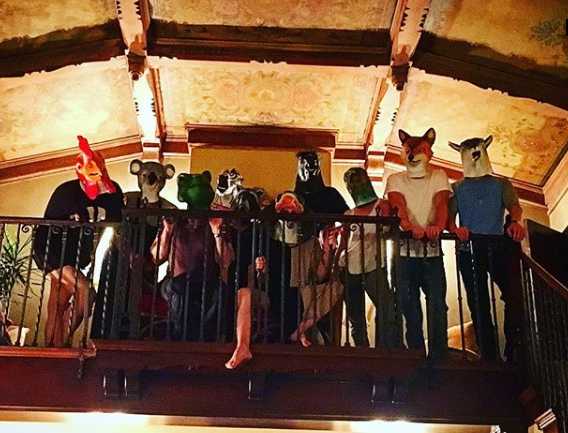
Traumas (Photo: Nocturnal Fandango)
“Magical realism and surrealism has been around in theater forever, going back to the Greek tradition of theater. It’s just convenient that we have access to these animal heads!” Kevin joked.
“It ties back to the human spirit, and how to portray that in a theater setting,” Jason said. “Non-human forms lend themselves to that nicely. But perception is everything. The animal masks may be terrifying to those in the show, but it’s not necessarily for everyone else.” This point hits home for me as, at one point, a horse headed man approached me in a very public place during SUDDEN LONELINESS while I interacted with another character. While I got nervous, everyone else around me seemed to not care or even notice.
Coming back to reality, the end of SUDDEN LONELINESS marked a milestone for Nocturnal Fandango, as they were granted non-profit status, a pretty monumental untaking.
“Much like other theater companies and museums, if they aren’t big enough to be self-sustaining, profitable businesses, they need to rely on donor funding,” said Kevin. “We are very fortunate to have a core audience who understand the financial challenges with producing immersive theatre and give generously.”
However, just because they now have non-profit status does not mean they do not want profits at the end of their shows.
“It just means that the profits from the show go back into the organization. There are no shareholders that get it, it doesn’t go into our back accounts, it goes right back into new work and our organizational mission as opposed to having to give it to the government for taxes,” said Kevin.
“It also helps to compensate our performers the way they should be,” Jason added. “Expectations are high, with long work days, so that helps quite a bit.”
As we wound down the interview, I couldn’t help but ask what the future holds for Nocturnal Fandango. Fans are already aware of NOSH, their stand-alone show coming up at the end of April.
“In a way, it’s going to be trickier, as we may not know some of the audience as well,” Kevin said of the new audience members it will bring it. “We don’t want to lose that magic of being able to tap into every audience member and make it personal, and we have some ways we are exploring to achieve that.”
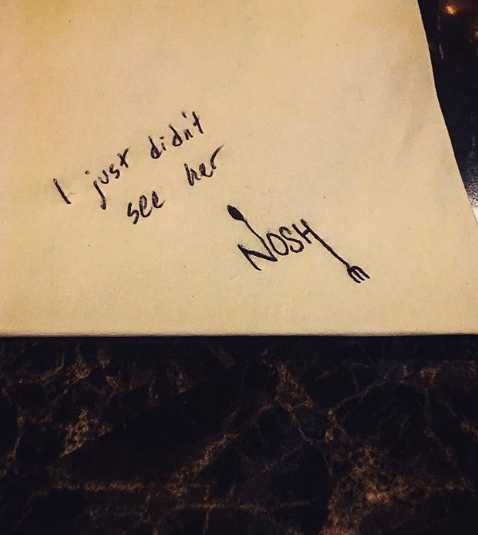
NOSH (Photo: Nocturnal Fandango)
For those who attended SUDDEN LONELINESS, they claimed that NOSH would be similar to how they structured ‘Poverty of the Soul,’ where there will be a number of scenes each show night, and every audience member will have their own ‘menu’ for the event.
“Like always, it’s possible for two people to come in and have two completely different shows,” Jason said. They are excited for what they have created for NOSH, as they feel it is true to their style and the work they do. It’s more conversation-driven, but still surprising and edgy.
“There is definitely a strong thematic chord running through the show, but each ‘course’ is its own stand-alone experience,” said Kevin.
As excited as I am for NOSH, of course I had to ask what they had planned for Season 3.
“We can’t say much yet, but it won’t be too long after NOSH,” Jason said.
“Things will be happening over the summer,” Chelsea added.
“Yes…things both connected to Season 3 and perhaps…not, as well,” Kevin said cryptically.
“But we can say we are very excited for Season 3,” Jason said. There is lots of world building, and casting going on now. It’s a very new world, and not a continuation of the others we’ve done so far.”
“That’s not to say you won’t encounter some of your favorite characters again, though,” Kevin added with a smile.
Regardless of what NOSH and Season 3 hold for us, I, along with the other audience members, are excited for whatever they have in store for us.
For more information on Nocturnal Fandango, and to find information about their upcoming shows, follow them on Instagram at: https://www.instagram.com/nfandango/


